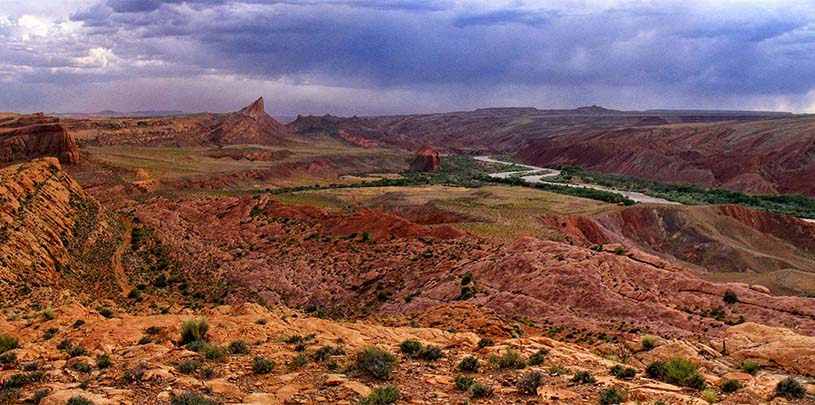
 by Megan Kelly, Energy Manager
by Megan Kelly, Energy Manager
What do abandoned oil and gas wells and gas passed by livestock (aka cow farts) have in common? If you guessed that they both emit methane, you are correct! For many years, we have known that a giant methane cloud the size of Connecticut hovers above the Southwest region. But this cloud isn’t caused by a special Colorado Plateau breed of flatulent cattle. The biggest contributor is methane emissions from oil and gas operations, where the colorless, odorless gas escapes during every step of production and distribution. Methane also leaks from abandoned oil and gas wells that are not cemented closed.
The good news is that a law just passed that provides funding to properly close abandoned oil and gas wells. Reduced methane pollution from these wells will clean up our air, stop feeding the plume of greenhouse gases overhead, and positively affect some of your favorite places on the Colorado Plateau.
Abandoned oil and gas wells contribute to climate change because they emit methane, which causes more than 80 times the warming as carbon dioxide. They also contaminate soil and air and threaten our arid region’s precious water resources and the health of surrounding communities. For these reasons and many more, orphan wells need to be properly closed, or “plugged,” and shouldn’t be left to sit open for decades continuing to pollute.
You’d think that plugging these wells is low hanging fruit, since they’re just sitting there unattended and are no longer producing fossil fuels, right? Unfortunately, closing these wells is easier said than done. Many of these so-called “orphan wells” don’t have owners, so funding their cleanup is quite challenging and often falls on the shoulders of tribal, state, and federal governments, and the public. But finally, there is a solution.
Recently, the Revive Economic Growth and Reclaim Orphan Wells (REGROW) Act of 2021 passed as part of a larger infrastructure package. It allocates nearly $5 billion for plugging orphan wells across the country. Out of this, $400 million is allocated toward orphan well cleanup on public and tribal lands. That means federal funding will be put toward properly closing these problematic orphan wells across the country, including the Colorado Plateau. This is great news!
There are nearly 6,400 abandoned oil and gas wells strewn across the Colorado Plateau leaking methane into the atmosphere. It’s inevitable that properly plugging them will positively affect some of your favorite places.
For example, Chaco Culture National Historical Park and Hovenweep National Monument are both close to clusters of abandoned wells in northwest New Mexico and southeast Utah, respectively.
The air quality in and near these areas will likely improve as surrounding abandoned wells are properly plugged. Along with methane, orphan wells emit volatile organic compounds, which can harm the respiratory system and aggravate lung diseases. Capping the abandoned wells will reduce the volatile organic compounds floating in our air.
Properly plugging abandoned oil and gas wells will improve air quality across the region while chipping away at the methane cloud hovering above the Four Corners region. It will also help protect our precious water resources, improve the health of communities and critters that live nearby, contribute to public health, and provide job opportunities for oil and gas workers. While the global community works together to stop climate change, this is one step in the right direction. And here at the Trust, we’re looking forward to the cleaner air ahead.
Did you know the Colorado River used to be called the Grand River? Learn about the name change and more fun facts about this hardworking river.
Read MoreChallenging conditions have endangered, threatened, or imperiled these five native fish in the Grand Canyon.
Read MoreBeneath the bathtub ring at Lake Powell, native plants are flourishing, cultural sites are resurfacing, and whitewater rapids are returning.
Read More